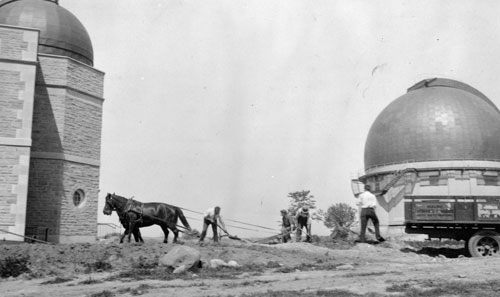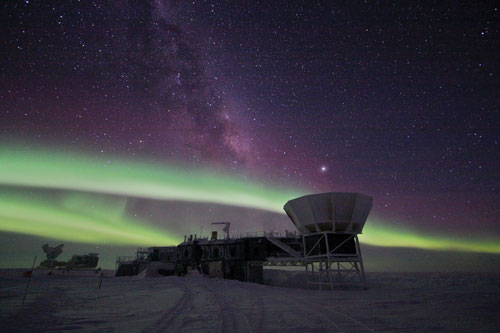J. Moffat Dunlap (Hon LLD 2011) passed away on September 11 in Toronto at age 82.
With other members of his family, he created a permanent legacy at the University of Toronto through supporting the Dunlap Institute for Astronomy & Astrophysics at the Faculty of Arts & Science. He was also a 20-year member of the Canadian show jumping team and a real estate executive.
More than a century ago, Dunlap’s grandfather, David A. Dunlap (1863-1924), became interested in building a major astronomy observatory to aid the research of U of T physics professor A.C. Chant. In 1930, David A.’s widow, Jessie Donalda Dunlap (1867-1946), donated funds and 76 hectares of land in Richmond Hill for the David Dunlap Observatory, which shot to the forefront of Canadian astronomical research. In 2008, with light pollution increasing in the region, the Dunlap heirs, including J. Moffatt Dunlap, agreed the land could be sold and that the largest share of the proceeds would endow the Dunlap Institute.

“Moffat Dunlap’s generosity sprang from a true vision for excellence in astronomical research,” said University of Toronto President Meric Gertler. “The Dunlap family’s support has been central to the success story of the Department of Astronomy and Astrophysics over the past century. And Moffat Dunlap’s support at a crucial moment helped put astronomy in Canada on a firm footing for the future. The University of Toronto community will always be grateful to him, and I extend heartfelt condolences to the Dunlap family on his passing.”
Moffat Dunlap helped create a family legacy and a research powerhouse.
For seven decades the Dunlap Observatory helped make some of the most groundbreaking discoveries in astronomy, including mapping the structure of the Milky Way Galaxy, finding the first empirical evidence of a black hole, and helping establish the rate at which the universe is expanding.
When the Dunlap family made their landmark donation in 2008, their gift created the Dunlap Endowment, which supports the ongoing work of the Dunlap Institute for Astronomy & Astrophysics and its faculty, postdocs, students and staff. Moffat and his brother David M. Dunlap (BASc 1961; Hon LLD 2011) were enthusiastic and dedicated champions of the Dunlap Institute, which undertakes exciting research that is particularly strong in radio astronomy and the study of pulsars and magnetism.
Today, Dunlap Institute astronomers and astrophysicists are active in diverse locations including remote mountains, the high arctic and the South Pole, where researchers observe cosmic microwave background radiation to understand the earliest years of the universe. Dunlap faculty members have made breakthroughs in understanding the mysterious and invisible dark matter, and helped prove that low-frequency gravitational waves make our entire universe hum.
“The Dunlap Institute has grown into an international powerhouse,” said Melanie Woodin, Dean of the Faculty of Arts & Science. “It applies innovative instrumentation, prepares leaders and brings the excitement of astronomy to the public through engaging outreach initiatives. I know there are tremendous things in store and that many decades of achievement lie in the future. Moffat Dunlap’s generosity has allowed us to make the wonders of the universe available to everyone.”
The Southern Lights make ghostly streaks across a starry sky above the South Pole Telescope.
Today, Dunlap Institute researchers are active around the world.
An athlete and a business executive with a passion for education
After graduating from Upper Canada College and the University of Western Ontario, Moffat Dunlap became a member of the Canadian Equestrian Team’s show jumping division. Competing for two decades, he helped the team to a bronze medal at the 1967 Pan-American Games and the gold at the 1970 World Championships.
In 1972, he founded Moffat Dunlap Real Estate, which specializes in equestrian and country property in southern Ontario. He also worked on many other large real estate projects, from the purchase of property for Canada’s Wonderland to the rezoning of the Devil’s Pulpit golf course on the Niagara escarpment. In addition, he advised the Koffler family in 1995 when they donated a biodiverse, nationally significant, 350-acre property to the University of Toronto to be used for ecological teaching and research. Today, it is the Koffler Scientific Reserve at Jokers Hill.

Generous with his time and expertise, Dunlap served as chair of Canada’s jumping team at the 1984 Olympic Games and president of the Royal Agricultural Winter Fair, and as director of the Canadian Horse Council, the Canadian Horse Shows Association and the Canadian Pony Club. He also served on boards at Seneca College and Humber College, and helped raise funds for Princess Margaret Cancer Centre and the Southlake Foundation. In 1971, he co-founded The Country Day School, an independent school in King Township, Ontario.
“When the University announced the new Dunlap Institute in 2008, the excitement among our students and faculty was palpable,” said David Palmer, Vice-President Advancement, “and the tremendous discoveries coming from the Dunlap Institute have kept that exhilaration fresh ever since. Truly, the relationship between the Dunlap family and the University of Toronto was made in the stars, and Moffat Dunlap’s legacy will always include a world of wonder.”

